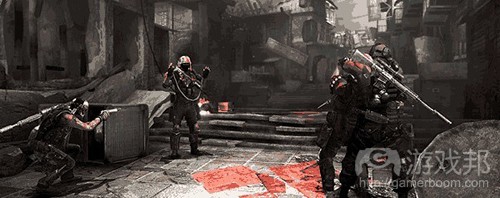分析以非致命战术替代“杀戮”的解决之道(一)
作者:Anjin Anhut
为了成为一款深受玩家喜爱且拥有商业利益的游戏,是否就应该进行一些“杀戮”?(请点击此处阅读本文第二部分)
免责申明:
我并不是因为电子游戏中的暴力因素而感到不舒服。我也曾在自己的电影中体验过暴力,如果处理妥当的话,暴力因素也能给观众带来犹如身处电影屏幕般强烈的情感体验和视觉震撼。乃至即使那些暴力看起来过于愚蠢或夸张,我们也会在最后恶棍受到处罚,或者所有的暴力得到缓解时深受感动和震惊。如果屏幕上的暴力行为并不带任何视觉,身体上或精神上的冲击,那么这种暴力也就失去了可信度和震撼感,这时候制片人和游戏设计者便可以考虑放弃这款游戏了。要想宣传你就必须拥有真材实料,所以不可轻易瞎抱怨。
观察:
在小说,电影以及游戏的黑白世界里,我们可以通过敌人的皮肤,工作,家乡或者健康状况等去判断他的身份,在这里我们从来不会去关心谁应该活着而谁应该死去。如果你摧毁了一个星球,便会死去。如果你是外太空的侵入者,便会死去。如果你是僵尸,便会死去。
经典科幻小说总是利用种族和区域差别去区分邪恶势力和正义力量。按照Tolkien(游戏邦注:英国语言学家,作家,创作了奇幻小说《魔戒》三部曲)的说法,任何来自魔都的生物,不论是半兽人还是强兽人,都应该被处决。在《星际迷航》(电影)中,直到Lt. Worff遇到新的企业号之前,整个星球上的居民都惧怕于克林贡族的暴力和好战行为(喜欢先战争后谈判)。在《星球大战》中,Hutts所发起的战争总被冠以贪婪,残忍,奸诈和衰败等代名词。在一些童话故事中,奸诈残忍的狼总扮演着恶棍形象。
当你在现实生活中或者历史上搜索这些反派角色时,你会发现反犹太主义,三K党,中东恐怖主义以及种族排斥主义等都属于这一类型。除非这些角色出现在小说或者游戏中(但是如果你是开枪者那就例外),要不全世界都不会容忍这些人的恶行。
尽管先进的技术能够制定出更多复杂且有效率的方法解决这些“恶霸”,但是针对于现今的电子游戏,仍然有越来越多正义之声呼啸而起。以前,每个游戏角色所占的字节(硬盘和内存)是昂贵的,而且玩家只能通过2个按钮和方向键操纵角色,所以开发者总是会尽可能地让游戏简单容易操作。但是现在,游戏世界里充斥着各种NPC角色,即所谓的城市居民以及一些不同的敌人类型,各种虚拟设备以及复杂的控制器,面对这种情形为何游戏设计者仍在执拗于过度简单地解决“杀戮与被杀”问题呢?
如果玩家摧毁了游戏中的所有人,动物,设备或者其它生物,那么他们将会死去,而他们这么做也会因此结束游戏,这就是公正的游戏规则。更简单地来说:如果谁移动了,那就杀了它。
总结:
显然这并不是一个很好的解决方法,但是决定是否杀了敌人可以提高游戏的趣味性,也更能够支撑游戏的叙述架构。
挑战:
电子游戏中的很多主角其实都很残忍,更像是一些精神病患者,只是被设计者穿上一些可靠且可敬的外衣罢了。我们要如何做才能让这些角色更加一致?
被杀掉的角色和生物自然要退出游戏。我们能否尝试着创造一种不一样的游戏情形,即让一些游戏敌人作为新的盟友或者让残忍的敌人重新回到游戏中?
杀戮将对杀手的心理产生巨大影响。我们是否能够因此对游戏做出稍许改变,即包括图像,玩家角色的行为等,与玩家杀死或打败敌人所用的时间联系在一起。
在很多文化中,杀戮被看做是一种罪孽。所以我们是否能尝试着在游戏中或者游戏最后创造一种有悖于刑罚和报应的救赎感?
非致死的杀戮行为需要依靠一定的技巧,是一个很棘手的问题。我们可以添加何种有趣的非致死技巧,策略或者武器到游戏中?
很多游戏玩家,或者单纯只是对游戏感兴趣的非游戏玩家发现很多美名其曰的杀戮其实是错误且令人厌恶的。如果当我们面对一些新玩家,且杀戮是我们的唯一选择,那么我们又应该怎么做?
当杀戮不再是战争中人们所默认的唯一方式,游戏设置和游戏故事又将具有何种优点?我们将在第二部分中做具体描述。
游戏邦注:原文发表于2010年4月30日,所涉事件和数据均以当时为准。(本文为游戏邦/gamerboom.com编译,如需转载请联系:游戏邦)
To Kill Or Not To Kill Part 1
April 30, 2010 by Anjin Anhut
Question:
Does a game need kills to be exciting, tense, believable and commercially successful?
Disclaimer:
I’m really no one to be offended by video game violence. Like in my movies I experience violence, when done right, as a catalyst for tension and drama, something that makes me feel what is happening on screen. And even when done in a silly and over the top way, I enjoy the sensations, the shock, the punishment of a villain and the relief, when the violence finally concludes into something peaceful and calm. Also when violent behavior on screen does not produce visible violence, physical or mental harm, t totally loses any hint of believability and the feeling emerges, that filmmakers and game designers in this case had to cave in and pull back. So, if you wanna bark, you also have to bite. No complains there.
Observation:
In the black and white worlds of fiction, movies and games, where enemies can be recognized by the color of their skin or their job, their hometown, or by their medical condition, often enough there is no discussion about who deserves to live and who deserves to die. You blow up a planet with your death star, you die. You are an invader from space, you die. You are a zombie, you die …for real.
Classic sci-fi and fantasy fiction heavily rely on racial and regional distinctions to clarify who is evil and who is righteous. So according to Tolkien, everything that comes from Mordor, like every single Orc and Uruk-Hai, can rightfully be beheaded. In the Star Trek universe, up until Lt. Worff was recruited for the new Enterprise, Klingons, yep the population of a whole planet, was to be feared for their violent and warmongering behaviour and better shot first and asked later. In Star Wars, the race of Hutts
always is portrayed as greedy, ruthless, treacherous and decadent. And of course archetypical villains in fairy tales, like the always treacherous and deathbringing Wolf can be found many.
The thing is, when you search for those kinds of damming generalizations in real life and history, you find anti-semitism, the KKK, middle eastern terrorism and ethnic cleansing. A big part of the world population recognizes those things as intolerable…. except when it happens in fiction and of course usually not in games, where you yourself are the one that pulls the trigger.
There is a widely spread sense of justification to shoot on sight in modern video games, despite the fact that technical advancements allow for a more complex and thoughtful approach to the matter. In the old days, where every character sprite was expensive in bytes and gameplay had to be handled with two buttons and a d-pad, it was understandable to play it simple. But now, with big and complex worlds full of npcs, so called civillians, and dozens of possible different enemy types, pieces of virtual equipment and complex controller input, why do game designers still fall back to an overly simplistic solution of “kill or get killed”?
Total destruction of every person, animal, device or creature possibly causing the player character to die, and by doing so causing a game over, is fair game. Or in more simple terms: If it moves, kill it.
Conclusion:
This of course is not in general a less favorable approach, but having to decide between taking down an enemy or killing him can add an interesting layer of depth to the gameplay and can be of strong support for the narration.
Challenges:
? Many heroes in video games are very ruthless and totally act like psychopaths, while still being mend to be relatable and likable. How do we make that more coherent?
? Characters and creatures that get killed, of course get erased from the game. Can we create challenging and satisfying game moments with spared enemies returning as thankful new ally or relentless more dangerous foe?
? Killing can have a strong impact on the killers psyche. Can we deliver significant and interesting changes to the overall game, graphics, player character behavior, depending how often he kills or spares his beaten enemies?
? In a lot of cultures, killing is judged as a sin. Can we create a sense of salvation versus damnation or karma in general, during the game or in the ending?
? Non-lethal takedowns of enemies, depending on the level of thread, can be quite tricky. What kind of interesting non-lethal techniques, strategies and satisfying non-lethal weapons can we add to the arsenal?
? A lot of the gaming public and interested non-gamers find the glorified killing of many titles to be kind of discusting and wrong. What kind of new audiences can we win for action titles, when killing is just an option, and how?
? What other advantages can gameplay and story have, when killing is not the default solution in combat?
Some answers and thoughts on that in part 2.(source:howtonotsuckatgamedesign)
上一篇:盘点20种未被充分利用的游戏机制








































 闽公网安备35020302001549号
闽公网安备35020302001549号